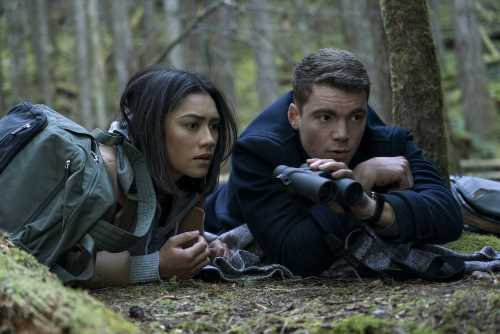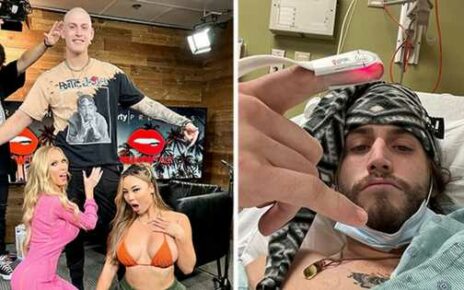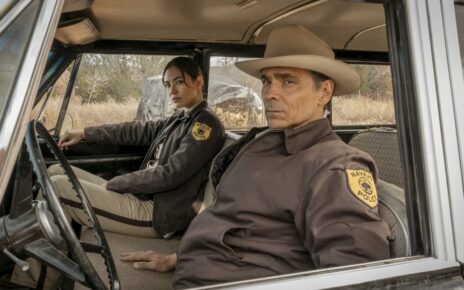SPOILER ALERT: This story contains spoilers for “Fathers,” the Season 1 finale of “The Night Agent,” now streaming on Netflix.
There goes the administration.
After a season spent hunting down –– and being hunted by –– an elaborate assassination plot against President Travers (Kari Matchett) from within her own office, beaten and bruised FBI Agent Peter Sutherland (Gabriel Basso) thwarts disaster at Camp David in the season finale of Netflix’s “The Night Agent.” But the high body count left in the wake might make it hard to run the country.
The directors of the Secret Service and the FBI are dead. Dozens of agents are also dead and/or guilty of treason in the domestic terrorist attack that would have seen Vice President Ashley Redfield (Christopher Shyer) sworn in as Commander in Chief. Instead, Redfield is outed as the engine of the power grab; and Diane Farr (Hong Chau), Travers’ chief of staff, survives only to face life behind bars for covering up the Metro bombing that kicked off the series.
Even though Peter technically held Travers at gunpoint to save her from boarding Marine One strapped with bombs, she doesn’t appear to have taken it too personally. She’s even ready to pin medals on him and Rose (Luciane Buchanan) for not letting a little thing like the constant threat of death stop them from rooting out the conspiracy. But they choose to remain anonymous, and ask for only one thing from their leader –– the truth about Peter’s father.

Since he was young, Peter has been told his father, also an agent, was responsible for an intel leak from the Pentagon, but he died before he could ever stand trial. It’s a reputation Peter contests, and one he can’t shake, especially after the Metro bombing put him in the spotlight and Farr stationed him at the Night Action phone.
Travers hands over the answers he wants, but the bad news is his father was guilty of leaking secrets. The good news is he felt really bad about it, and intended to become a double agent before he was killed by a foreign operative –– a far cry from the car accident story Peter was fed.
It’s not the ending Peter hoped for, but he does get something for his troubles. Travers pulls him off Night Action phone duty to become a Night Agent on the other end of the line, an opportunity that promises big changes for the show should it be renewed by Netflix.
“If and when the time came to make a Season 2, my thoughts have always been that we find Peter in a different world, as we hinted at in the finale,” creator and showrunner Shawn Ryan tells Variety.
Ryan, the creator behind “The Shield” and “S.W.A.T,” and Basso spoke to Variety about Ryan’s personal connection to the series, how they landed Oscar-nominated Chau for the crucial role of Farr — and why they wanted to elevate the political thriller.
Shawn, you have worked with corrupt law enforcement on “The Shield,” ground-level heroics on “S.W.A.T.” and even time travel on “Timeless.” What about the political thriller genre appealed to you with “The Night Agent”?
Shawn Ryan: I have never worked in this genre. I always thought it was reserved for movies, and television struggled in this space. My assessment was that it was hard to stack reveal and plot twist, reveal and plot twist on each other in order to make a show. The solution in my mind was to dive deeper into character. Yes, you are going to have all the things about political thrillers that appeal to you in the movies. But we could dig deeper into relationships like Peter and Rose’s.
And ultimately, the thing that differentiated this story for me was that my father passed away very suddenly in 2015. When my brother and I went to clean up his house, we found newspaper clippings that he had kept all these years of things that had happened he had never told me about. I was so curious about what the truth was with my father, and I was devastated I would never get to ask him these questions and get the answers. At the heart of this show, Gabriel’s character Peter has unanswered questions about his father and what the truth is. That was the real emotional center for me that made this something beyond a political thriller.
Did you know of Matthew Quick’s book on which this is based, and how it paralleled some of those questions you were asking within your own family?
Ryan: I didn’t. Jamie Vanderbilt, who is a great writer and producer that I respect a lot, and his company, had the rights to the book, and they asked if I would read it. The pandemic hit and I suddenly had the time to do it and I started making the connections with my own father. I loved the characters of Peter, Rose and Diane Farr, and I saw how I could use the book to meld with some original ideas I had been working on to make a TV show out of it.
Gabriel, this is a very intensive role. It’s not just physical, but also very emotionally challenging. How did you prepare to play Peter?
Gabriel Basso: In regards to the physicality, I didn’t really have to do anything different because I already enjoy training and stuff like that. But I think it helped that the character stuff informed the physical stuff. It didn’t really ever feel gratuitous, like action for the sake of action. What I love about this show is that everyone I fight has a name. It was never me beating up random faceless bad guys. You are invested narratively in the action, and I think that is unique.

Giving a bad guy a name certainly does make it more satisfying when Peter finally punches them.
Basso: Exactly! And there are stakes because the trauma that Peter suffers in these fights adds up throughout the show. There is never really a weightless moment in a fight. If I get hit in a fight, you will feel it in how Peter is carrying himself three episodes later. Wounds get reopened, and that’s cool and realistic.
Did you also end filming with a bunch of accumulated bruises like Peter?
Basso: Not really! Just emotional bruises.
In the finale, Travers reveals the truth about Peter’s father. He was guilty, but also kind of not. Knowing this now, does this lift a weight off his shoulders?
Basso: I think the toughest thing for Peter is that the lies and the circumstances his father found himself in might be a reflection of his character as a man. It’s not necessarily that he was guilty or not, but rather that what happened was indicative of his values that he instilled in Peter. I say at one point in the show that my dad believed in the system and due process, and then he was deprived of that. Knowing the truth now might help him, but I think there will always be that part of him that never got to know his dad as a man, guilty or not.
Knowing your personal connection to the material, was there a catharsis for you, Shawn, in being able to give Peter the closure you don’t have with your father?
Ryan: Absolutely. One of the great things about being a writer is that you can write the ending you want, not the ending you have. Part of this is taken from the book. We deviate a lot from the book, but this is in the book. That Peter’s father did hand over secrets and was a traitor, so to speak. So for me, if we were to get a second season, I think one of the interesting things we could delve into is Peter trying to figure out the why. Why did his father do this? What were the choices he was faced with and why did he make that decision? One thing I would want to examine is if Peter can get to a place of forgiving his father for that.
I thank God we found Gabriel for this role. I think he was born for it. The emotion, the physicality. There is something that Gabriel brings that I just can’t write on the page, and I hope he and I get to make this show for a while longer.
Basso: I really appreciate that, Shawn!
Is there any way for President Travers to ever regain credibility after half of her administration is guilty of espionage and murder, and the other half has died in the crossfire?
Ryan: I imagine it would be very difficult for Travers to get reelected after all of this. If and when the time came to make a Season 2, my thoughts have always been that we find Peter in a different world, as we hinted at in the finale. I don’t think we would spend a lot of time figuring out what the political fallout is. In many ways, I’m not interested in diving into the divisiveness in this country between Democrats and Republicans. I’m more interested in, psychologically, what makes these people who seek these positions of power tick and what compromises they make to their souls along the way.
Basso: For me, as an actor, I always thought that when Travers offers me the role of Night Agent at the end, I’m agreeing for Travers. Clearly Peter has the objective good in mind. But depending on who the next president is, maybe they are not so objective in their morality. But it will still be his job. I think it is interesting to ask if you can have values in a job where selective morality involves saying “Go kill that guy for democracy.” I don’t know how long Peter can make it in that environment.

It’s hard to hate Hong Chau, even if she is playing someone plotting domestic terrorist attacks. She’s just so good. How did you pitch this show to her? It’s quite different from some of her more recent work.
Ryan: I really admire her work, and my approach to her was that I don’t like calling people heroes or villains in this show. Diane Farr has a very firm perspective that she is doing the right thing. I always talk about this quote from David Mamet, when I worked with him on “The Unit.” He would always talk about how good drama is not the choice between good and bad. Good drama is the choice between two bads. To me, Diane Farr is someone who has only been presented with bad options, and along the way she has made very difficult choices that she believes are the best choices of multiple bad ones.
What I said to Hong is that she is initially an ally, then she is suspected of being an adversary, then she convinces Peter she’s an ally — and then she is revealed to actually be an adversary. But the whole time, she believes she is doing what’s right. She’s resentful for having been pulled into this situation. We’ve heard a thousand times that it’s more about the coverup than the crime. She wasn’t really involved with the initial Metro bombing, but she did allow herself, for what she thought was the greater good, to get sucked into the cover up. Hong had just come off making two amazing independent movies, which turned out to be “The Whale” and “The Menu.” And I think she saw this was something that could be a high-quality political genre thing that she hadn’t done. We talked about how we could elevate the genre to be more than just a shoot-em-up chase show. I think she thrives on throwing herself into things she hasn’t done before, so I’ve got to be honest, it wasn’t that hard to talk her into it.
Diane Farr does survive, but this show was not afraid to kill off major characters well before the finale. The two assassins were killed, Agent Monks (D.B. Woodside) is killed. Was that unpredictability fun to play with as an actor?
Basso: It feels a little unrealistic if everybody makes it out alive. Shawn wanted to make this as grounded as possible, and in the real world you aren’t the main character. No one is indispensable, and it is nice to feel that. There is a reminder throughout the season that this isn’t a “happily ever after” story. If it is that, it undoes the whole structure of the show.
Peter becomes a Night Agent at the end of the season, and jets off for his first mission. Do you already know what his inevitable code name would be in Season 2?
Basso: I trust Shawn implicitly, so I will defer to him on this one.
Ryan: I am so in love with this show, and I so want to make future episodes. But it is a little torturous to think too much about that before it happens, so I haven’t thought about it. But it’s a great point. We are going to have to figure it out if we do get a Season 2. Rose’s aunt and uncle were Sidewinder and Gazelle, so we’ll have to figure out what the perfect avatar for Peter is.
This interview has been edited and condensed.
Read More About:
Source: Read Full Article



